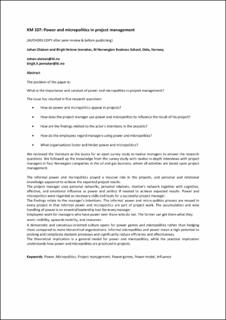| dc.description.abstract | The problem of the paper is: What is the importance and conduct of power and micropolitics in project management? The issue has resulted in five research questions: • How do power and micropolitics appear in projects? • How does the project manager use power and micropolitics to influence the result of his project? • How are the findings related to the actor's intentions in the projects? • How do the employees regard managers using power and micropolitics? • What organizations foster and hinder power and micropolitics? We reviewed the literature as the basics for an open survey study to twelve managers to answer the research questions. We followed up the knowledge from the survey study with twelve in-depth interviews with project managers in four Norwegian companies in the oil and gas business, where all activities are based upon project management. The informal power and micropolitics played a massive role in the projects, and personal and relational knowledge appeared to achieve the expected project results. The project manager uses personal networks, personal relations, mentor's network together with cognitive, affective, and emotional influence as power and politics if needed to achieve expected results. Power and micropolitics were regarded as necessary skills and tools for a successful project manager. The findings relate to the manager's intentions. The informal power and micro-politics process are reused in every project in that informal power and micropolitics are part of project work. The accumulation and wise handling of power is an essential leadership tool for every manager. Employees work for managers who have power over those who do not. The former can get them what they want: visibility, upwards mobility, and resources. A democratic and consensus-oriented culture opens for power games and micropolitics rather than hedging them compared to more hierarchical organizations. Informal micropolitics and power mean a high potential to prolong and complicate decision processes and significantly reduce efficiency and effectiveness. The theoretical implication is a general model for power and micropolitics, while the practical implication understands how power and micropolitics are practiced in projects. | en_US |
